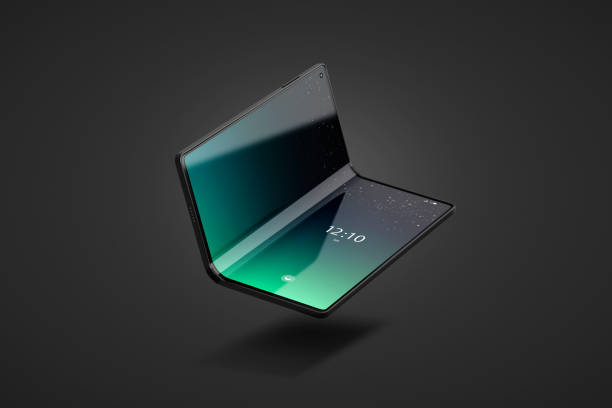Table of Contents
The smartphone industry is at a pivotal moment, where innovation is accelerating rapidly, reshaping the way we interact with our devices. From foldable screens to the widespread adoption of 5G, the future of smartphones promises to bring about significant changes in design, functionality, and connectivity. As these technologies mature, they will redefine not only the devices themselves but also how we use them in our daily lives.

The Rise of Foldable Smartphones
One of the most exciting developments in the smartphone industry is the emergence of foldable devices. After years of research and development, foldable smartphones are finally becoming a reality, offering users a blend of portability and expansive screen space. These devices feature flexible displays that allow the screen to fold in half, transforming from a compact smartphone into a larger tablet-like device.
The potential applications for foldable smartphones are vast. For example, multitasking becomes more intuitive with a larger screen, allowing users to run multiple apps simultaneously, side by side. This could revolutionize productivity on the go, making it easier to work, browse, and communicate without needing to switch between devices. Additionally, foldable designs could enhance gaming and entertainment experiences by providing a more immersive viewing environment.
However, there are challenges to overcome, including durability concerns and the high cost of production. As the technology improves and becomes more accessible, foldable smartphones are likely to become a more common feature in the market, appealing to a broad range of users who seek the convenience of a smartphone combined with the functionality of a tablet.
5G Connectivity: Unlocking New Possibilities
Another major trend shaping the future of smartphones is the rollout of 5G networks. The fifth generation of mobile network technology promises to deliver faster speeds, lower latency, and increased capacity compared to its predecessors. With 5G, downloading large files, streaming high-definition content, and engaging in video calls will be faster and more seamless than ever before.
Beyond just faster internet, 5G is expected to enable a new era of connectivity. The increased bandwidth and reduced latency will pave the way for advancements in augmented reality (AR) and virtual reality (VR) applications, making these technologies more practical for everyday use. Imagine walking down the street and receiving real-time information about nearby shops, or attending a virtual meeting with colleagues from around the world, all through your smartphone.
In addition, 5G will play a crucial role in the development of smart cities and the Internet of Things (IoT). As more devices become connected to the internet, from cars to household appliances, 5G will provide the infrastructure needed to support this massive network of connected devices, making our cities smarter and more efficient.

Beyond Hardware: The Future of Smartphone Software
While hardware innovations like foldable screens and 5G connectivity are making headlines, the future of smartphones will also be shaped by advancements in software. Artificial intelligence (AI) is becoming increasingly integrated into smartphones, enabling more personalized and intuitive user experiences. From voice assistants that can understand context to cameras that automatically adjust settings based on the environment, AI is making smartphones smarter.
One area where AI will continue to evolve is in predictive analytics. Smartphones will become better at anticipating user needs, offering suggestions and automating tasks based on patterns in behavior. For example, your phone might automatically adjust its settings when you enter a meeting, or suggest an app based on the time of day and your location.
Privacy and security will also remain critical concerns as smartphones become more integral to our lives. Biometric authentication methods, such as facial recognition and fingerprint scanning, will continue to improve, providing more secure and convenient ways to unlock devices and authenticate transactions. Additionally, software updates will increasingly focus on protecting user data and ensuring that devices remain secure against new threats.
The Impact of Sustainability on Smartphone Design
As awareness of environmental issues grows, the smartphone industry is beginning to grapple with the need for more sustainable practices. The future of smartphones will likely see a greater emphasis on sustainability, from the materials used in production to the lifecycle of the device.
One potential area of development is modular design, where smartphones are built with replaceable components. This approach could extend the lifespan of devices by allowing users to upgrade or replace parts, such as the battery or camera, without needing to buy a new phone. Additionally, efforts to reduce electronic waste through recycling programs and the use of eco-friendly materials are likely to become more prominent.
Moreover, software updates could be optimized to ensure that older devices remain functional for longer periods, reducing the need for frequent upgrades and minimizing the environmental impact of smartphone production.

A Glimpse into the Future
The future of smartphones is bright, with advancements in hardware, software, and connectivity poised to transform how we use these essential devices. Foldable screens will redefine our interaction with mobile devices, offering new possibilities for multitasking and entertainment. The rollout of 5G will unlock unprecedented speeds and connectivity, enabling a new wave of innovations in AR, VR, and IoT.
As AI continues to enhance the intelligence of smartphones, users will enjoy more personalized and seamless experiences, while sustainability efforts will drive changes in design and manufacturing processes. The smartphone of the future will not only be more powerful and versatile but also more in tune with the needs of both users and the planet.
As these trends converge, they will create a new era of mobile technology that will shape the way we live, work, and connect with the world around us. The smartphone is no longer just a tool; it is becoming an extension of ourselves, constantly evolving to meet our changing needs and expectations.

